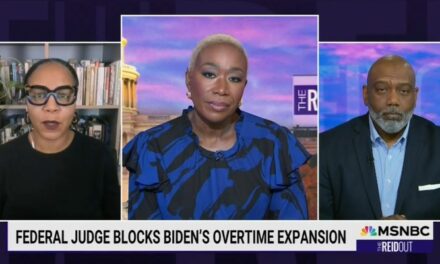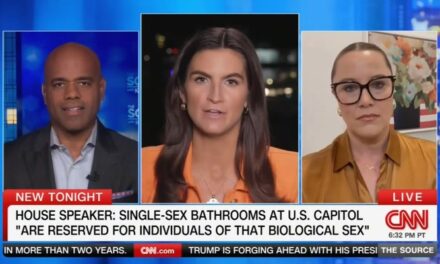We support our Publishers and Content Creators. You can view this story on their website by CLICKING HERE.
Wednesday’s PBS News Hour featured a propagandistic, nine-and-a-half minute segment on the important case argued before the Supreme Court involving a Tennessee law banning transgender surgery for minors: “Supreme Court hears arguments in most significant trans rights case to reach bench.”
The taxpayer-funded network actually opened its broadcast with emotional blackmail, in the guise of a clip from a sympathetic “transgender” child hypothetically endangered by Tennessee’s responsible move to restrict so-called “gender-affirming care” for minors.
Co-anchor Amna Nawaz: On the News Hour tonight, a U.S. Supreme court case pushes transgender rights for minors back into the spotlight.
Eli Givens, Transgender Youth: Being transgender is hard enough, and you hear all these things that lawmakers are saying about you. It makes you feel like there is no purpose.
From the start, PBS played on fears of suicidal ideation (a false narrative exposed yesterday by Justice Samuel Alito) if impressionable children don’t get to sign on for permanent body modification.
The actual segment was no better. Evasive PBS didn’t delve into Eli’s “top surgery” – the act of removing a girl’s breasts ostensibly to make her chest look more “masculine.” Reporter Laura Barron-Lopez, the outlet’s most fervent cheerleader on trans-kid issues, skipped those nauseating details regarding such unnecessary mutilation being performed on minors, leaning on that “top surgery” euphemism.
A misnomer term favored by trans-activists, “gender-affirming care,” cropped up nine times, better translated as “cross-sex hormones, castration, and breast removal.”
Co-Anchor Geoff Bennett: The Supreme Court heard arguments today in a landmark case on transgender rights. The justices are weighing whether a Tennessee law barring gender-affirming care for minors violates the Equal Protection Clause of the U.S. Constitution.
Nawaz: Roughly 300,000 young people identify as transgender in this country, and a decision in this case would have major implications for them, their families, and medical providers. Laura Barron-Lopez reports.
Laura Barron-Lopez: Eli Givens has been camping outside the Supreme Court since late last night.
Eli Givens, Transgender Youth: Hi, you all. It’s Eli reporting in from the Supreme Court.
Barron-Lopez: Joined by other activists and advocates, Givens is urging the conservative-dominated court to protect the rights of transgender youth like themselves.
Givens performed a shocking amount of the “reporting,” an untouchable stand-in performing the emotional blackmail in front of the Supreme Court: Strike down the Tennessee law or prepare for the deaths of children.
Givens: Many kids just like me have had such a difficult time making it to 18. Many of us will not make it to 18.
Barron-Lopez: ….The question at the heart of today’s arguments, whether a Tennessee law banning gender-affirming care for transgender people younger than 18, like puberty blockers, hormone treatments, and surgery, violates the Equal Protection Clause under the 14th Amendment…..
After a relevant clip from President-elect Donald Trump, she continued in the same hostile vein.
Barron-Lopez: Now, after an election in which Donald Trump and Republicans promised to roll back protections for transgender Americans, the Supreme Court is wading into the issue. The outcome could dramatically alter the lives of youth like Givens, who in 2022, at the age of 17, underwent gender-affirming chest reconstruction, also known as top surgery.
PBS avoided the nuttier protests outside the Supreme Court, while awkwardly shoehorning in woke phrasing like “non-transgender males” in reference to actual males.
Barron-Lopez: Surgeries among transgender youth are very rare, and breast reduction among minors is actually more frequent among non-transgender males. But if Givens had waited just one more year, they would have been blocked by Tennessee’s ban.
PBS also skipped how Justice Samuel Alito coaxed major concessions out of those challenging the ban before the Court (one prime example, via X). Instead of facts, the reporter piled on the blackmail from teenaged Givens.
Givens: Surgery has saved my life and social transition has saved my life. Being a trans youth member is, like, hard enough, but when you have so much pressure from legislative politics and you’re hearing all of these things that lawmakers are saying about you without ever even speaking to you, also refusing to speak to you, it really — it makes you feel like there is no purpose and that you can’t grow older or you’re just going to deal with hardship for the rest of your life.
“Gender-affirming” euphemisms abounded, both from talking heads and the “balanced” PBS reporter.
Barron-Lopez: But Dr. Joshua Safer, who leads the Mount Sinai Center for Transgender Medicine and Surgery in New York, says gender-affirming care is as medically necessary as other forms of health care….Though it’s unclear how the justices will ultimately rule in this case, the stakes are higher than ever for transgender youth.
This trans-kid propaganda segment was brought to you in part by Consumer Cellular.
A transcript is available, click “Expand.”
PBS News Hour
12/4/24
7:08:52 p.m. (ET)
Geoff Bennett: Good evening. I’m Geoff Bennett.
Amna Nawaz: I’m Amna Nawaz. On the News Hour tonight, a U.S. Supreme court case pushes transgender rights for minors back into the spotlight.
UNID: Being transgender is hard enough, and you hear all these things that lawmakers are saying about you. It makes you feel like there is no purpose.
….
Geoff Bennett: The Supreme Court heard arguments today in a landmark case on transgender rights. The justices are weighing whether a Tennessee law barring gender-affirming care for minors violates the Equal Protection Clause of the U.S. Constitution.
Amna Nawaz: Roughly 300,000 young people identify as transgender in this country. And a decision in this case would have major implications for them, their families, and medical providers. Laura Barron-Lopez reports.
Laura Barron-Lopez: Eli Givens has been camping outside the Supreme Court since late last night.
Eli Givens, Transgender Youth: Hi, you all. It’s Eli reporting in from the Supreme Court.
Laura Barron-Lopez: Joined by other activists and advocates, Givens is urging the conservative-dominated court to protect the rights of transgender youth like themselves.
Eli Givens: Many kids just like me have had such a difficult time making it to 18. Many of us will not make it to 18.
Laura Barron-Lopez: Inside the court, justices heard arguments in the most significant trans rights case to ever reach the bench. The question at the heart of today’s arguments, whether a Tennessee law banning gender-affirming care for transgender people younger than 18, like puberty blockers, hormone treatments, and surgery, violates the Equal Protection Clause under the 14th Amendment. The law also allows people to take legal action against medical providers. Since 2021, 26 states, including Tennessee, have banned or restricted access to gender-affirming health care for minors, a wave of laws enacted by Republicans that affect roughly 40 percent of the nation’s trans youth.
Donald Trump, Former President of the United States (R) and Current U.S. President-Elect: The only genders recognized by the United States government are male and female, and they are assigned at birth.
Laura Barron-Lopez: Now, after an election in which Donald Trump and Republicans promised to roll back protections for transgender Americans, the Supreme Court is wading into the issue. The outcome could dramatically alter the lives of youth like Givens, who in 2022, at the age of 17, underwent gender-affirming chest reconstruction, also known as top surgery.
Eli Givens: For me, it was a very, like, slow process of making sure that this is what I want to do and this is who I am.
Laura Barron-Lopez: Surgeries among transgender youth are very rare, and breast reduction among minors is actually more frequent among non-transgender males. But if Givens had waited just one more year, they would have been blocked by Tennessee’s ban.
Eli Givens: Surgery has saved my life and social transition has saved my life. Being a trans youth member is, like, hard enough, but when you have so much pressure from legislative politics and you’re hearing all of these things that lawmakers are saying about you without ever even speaking to you, also refusing to speak to you, it really — it makes you feel like there is no purpose and that you can’t grow older or you’re just going to deal with hardship for the rest of your life.
Laura Barron-Lopez: Today at the court, challengers to Tennessee’s ban urge the justices to look at the law with heightened scrutiny, arguing that it discriminates on the basis of sex and transgender status.
Elizabeth Prelogar, U.S. Solicitor General: The problem with Tennessee’s law here is not that it’s just a little bit overinclusive or a little bit underinclusive, but that it’s a sweeping categorical ban, where the legislature didn’t even take into account the significant health benefits that can come from providing gender-affirming care, including reduced suicidal ideation and suicide attempts.
Laura Barron-Lopez: Conservative justices pointed out medical and scientific disputes around gender-affirming care in other countries and asked if the issue is better sent back to the states.
John Roberts, Chief Justice of the U.S. Supreme Court: Doesn’t that make a stronger case for us to leave those determinations to the legislative bodies, rather than try to determine them for ourselves?
Laura Barron-Lopez: Solicitor General Elizabeth Prelogar, representing the Biden administration, acknowledged that there is some debate, but argued there is a consensus that such care is medically necessary for some minors.
Brett Kavanaugh, U.S. Supreme Court Associate Justice: You say there are benefits from allowing these treatments, but there are also harms, right, from allowing these treatments. At least the state says so, including lost fertility, the physical and psychological effects on those who later change their mind and want to detransition, which I don’t think we can ignore.
Elizabeth Prelogar: If you’re thinking about this from the standpoint of there’s no harm in just making them wait until they’re adults, what this law is doing is saying, we’re going to make all adolescents in the state develop the physical secondary sex characteristics consistent with their gender or with their sex assigned at birth, even though that might significantly worsen gender dysphoria, increase the risk of suicide, and, I think critically, make it much harder to live and be accepted in their gender identity as an adult.
Laura Barron-Lopez: Gender-affirming care is endorsed by every major U.S. medical association, including the American Academy of Pediatrics. Prelogar was joined for arguments by ACLU attorney Chase Strangio, the first openly transgender lawyer to present a case before the High Court. For the Republican-controlled state of Tennessee, Solicitor General Matt Rice argued that the ban is based on medical purpose, not a patient’s sex.
Matthew Rice, Tennessee Solicitor General: Just as using morphine to manage pain differs from using it to assist suicide, using hormones and puberty blockers to address a physical condition is far different from using it to address psychological distress associated with one’s body.
Laura Barron-Lopez: But liberal justice’s questioned Tennessee’s premise.
Elena Kagan, U.S. Supreme Court Associate Justice: The whole thing is imbued with sex. It’s a dodge to say that this is not based on sex, it’s based on medical purpose, when the medical purpose is utterly and entirely about sex.
Matthew Rice: We don’t think it’s actually drawing a line based on sex, and, again, the only way that my friends can point to a sex-based line is to conflate the use of puberty blockers to address precocious puberty with the use of puberty blockers to transition, and those are fundamentally different treatments.
Marcia Coyle: Coming out of more than two hours of argument, my sense is that the Tennessee law will be upheld primarily by at least five conservative justices on the Supreme Court.
Laura Barron-Lopez: Supreme Court analyst Marcia Coyle says the justices appeared to take partisan lines during questioning.
Marcia Coyle: There was sympathy among the liberal justices that this is discrimination on the basis of sex and transgender status, but there are only three on the liberal side of the court.
Laura Barron-Lopez: Conservative groups who wrote amicus briefs in support of Tennessee’s law claim gender-affirming care bans for minors are about protecting children. Marc Wheat, who is legal counsel for one of those organizations, Advancing American Freedom, says being transgender is a — quote — “ideology.”
J. Marc Wheat, General Counsel, Advancing American Freedom: In the case of puberty blockers, hormone therapy, surgery that mutilates their bodies, what you have is something where the children are not sick with a physical ailment. This is a mental and psychological issue. But on the other side of the balance, what they lose is their ability to procreate. Girls will not be able to breast-feed their babies. They may not be able to conceive. A boy may not be able to found his own family.
Laura Barron-Lopez: But Dr. Joshua Safer, who leads the Mount Sinai Center for Transgender Medicine and Surgery in New York, says gender-affirming care is as medically necessary as other forms of health care.
Dr. Joshua Safer, the Mount Sinai Center for Transgender Medicine and Surgery: Our approach for youth is already very conservative, with a lower-case C. And the guidelines that we follow are quite conservative already, so, just as you would expect they would be across all of medicine. Part of our conservatism in the health care community is that we don’t give medicines to anybody under the age of 18 without their parents’ consent.
Laura Barron-Lopez: Though it’s unclear how the justices will ultimately rule in this case, the stakes are higher than ever for transgender youth.

 Conservative
Conservative  Search
Search Trending
Trending Current News
Current News 





